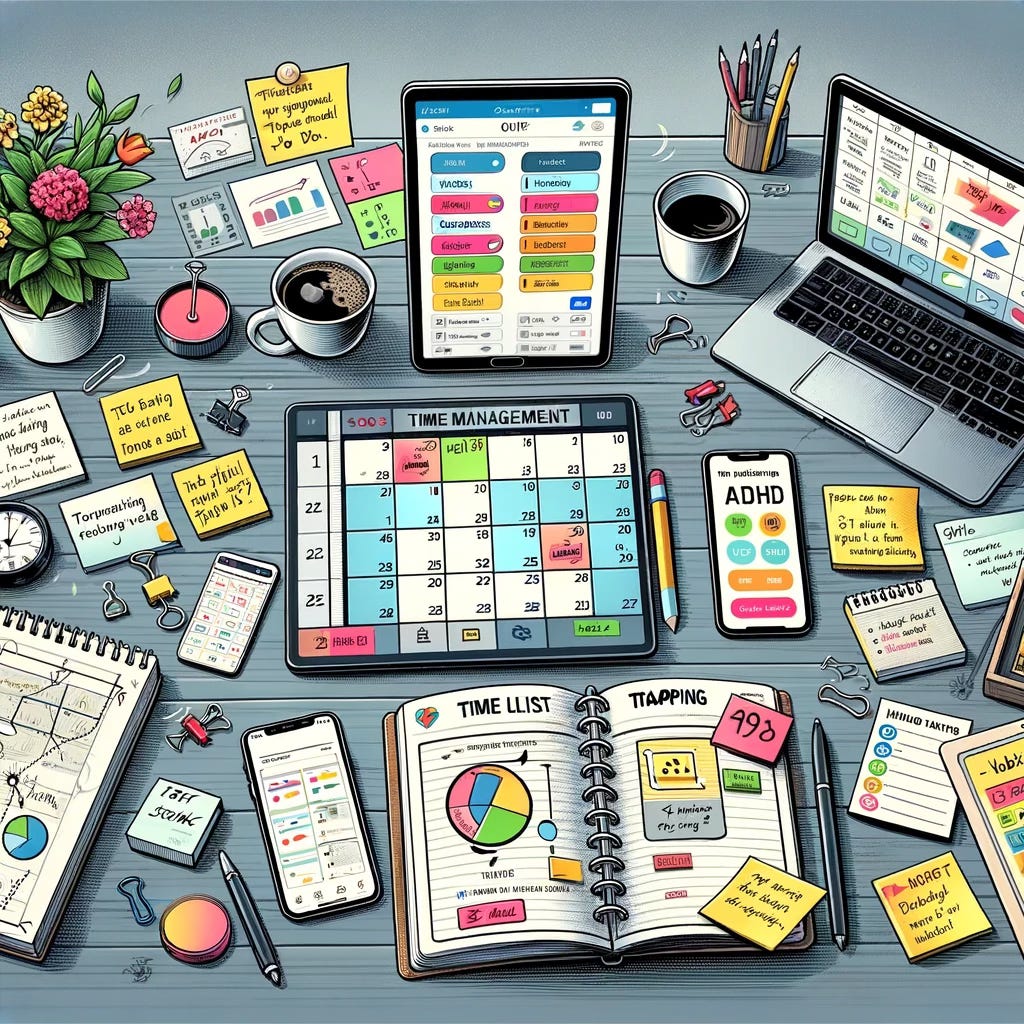A Different Metaphor for Time-Blindness
Tell me if this resonates:
image created via Dall-E
I’m working on a larger piece about scheduling tools for professionals with ADHD, and I’m wondering how this analogy lands with people:
Think about your morning commute.
Think about how many signs you rely on — street signs, construction notifications, speed limits.
And how many signals — seeing when to stop, when to go, when people are going to change lanes. In fact, think about how irritating it is when someone cuts in front of you *without* signaling. How that puts you on edge, spikes your cortisol, makes your heart beat faster with fear masked as anger (because it’s not that you’re mad abut the signal, you’re mad because of what could have happened if you weren’t a good enough driver to have noticed them moving over).
Now that you’ve imagined that, imagine that you have a certain kind of mental disability that made you **blind to all the signs and signals.**
You could see everything still. You could drive, you had the skills, but you had to make your best guess about where to turn. You had to be hyper-vigilant while driving, because you never knew when someone was going to slow down, turn, or when traffic might get faster or slower. You had to deal with other drivers honking angrily or shaking their head at you as you try to drive as well as they do — but the thing is, they can see the signs, they can read the signals, it’s second nature to them.
*Why don’t you just try to drive better?*
Welcome to the world of a time-blind professional with ADHD. Except instead of making the commute to work, we’re traveling through time — all in the same direction as our coworkers, both neurotypical and neurodivergent.
But very much *not* at the same rate. We’ll talk about that later.
To carry the metaphor a bit further, if you were blind to the signals that had been created for people that could see them but still had to get places, you would likely find other ways to help you travel. If you can’t rely on your senses, you’d use other sensors that you *could* rely on - perhaps the odometer telling you distance, combined with a map of the area. Maybe you’d spend extra time driving around, trying to connect landmarks to your common destinations.
And if there was a new destination, or a new route you had to take, you’d simply buckle down and accept that getting to where you need to be was going to be a bit more complex for you than for most of your colleagues.
That’s the difference — a professional finds scheduling tools *useful*. For a professional with ADHD, they are *necessary*.
Most people have a general idea of what they are going to do during their day. Most people can tell when a certain amount of time has passed, and they need to move on to something else.
**That’s not how it works for the professional with ADHD.** Put them in a room where there’s nothing to do, and after a bit ask them how long they think they’ve been there.
*Forever.*
On the other hand, put them in a room with something they care about, they are interested in, they enjoy doing, and leave them there for three or four hours. Then come in and tell them it’s time to leave.
*What, already?*
I know, I know. “*That happens to everybody*.” Yes, of course it does — it just happens to people with ADHD *more*. A lot more. In fact, for some, it feels like *all* the time.
There is no such concept of “*a while*”, “*a bit*”, or that nefarious prankster, “*just a few*”.
There is *now*. And there is *not now*.
Anything else? We have to rely on externalized systems.
What do you think? Does this describe the feeling of trying to fit what you want to do into the time you’re given to do it, and how it feels as the time passes?


